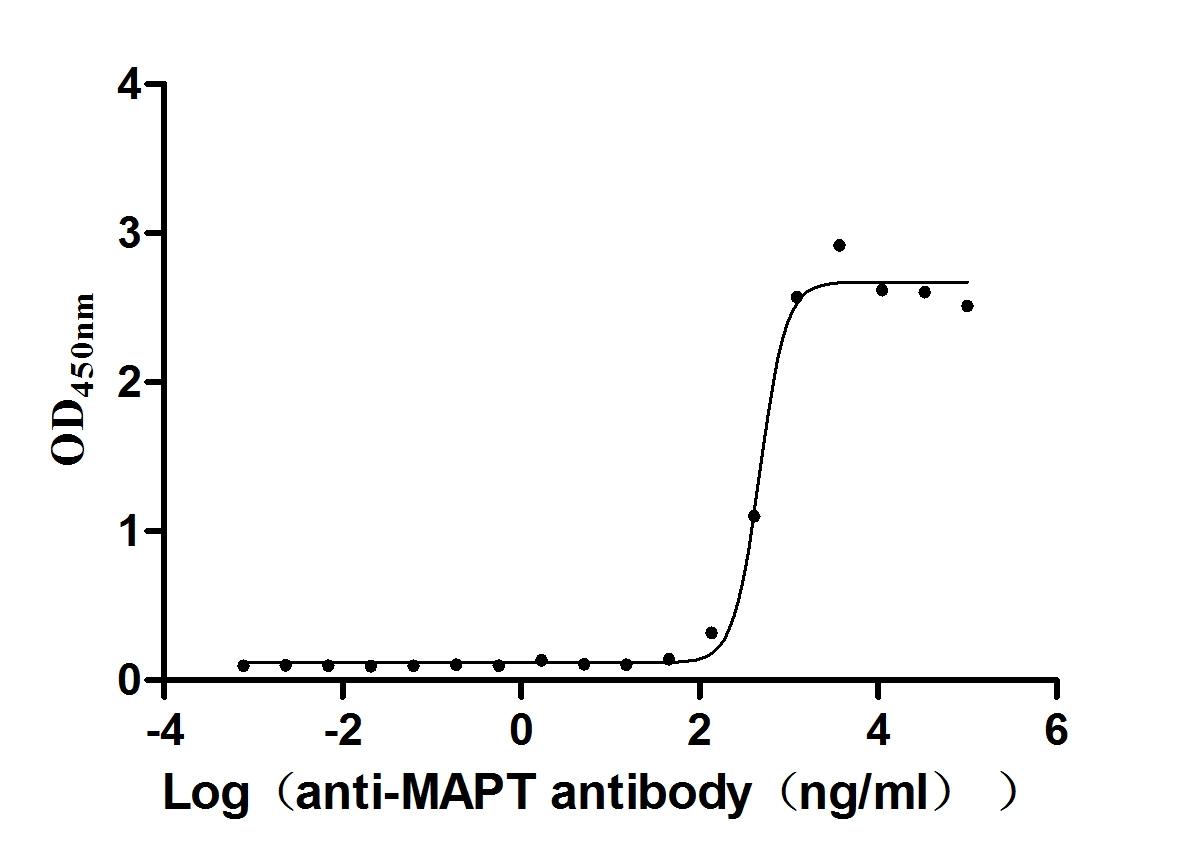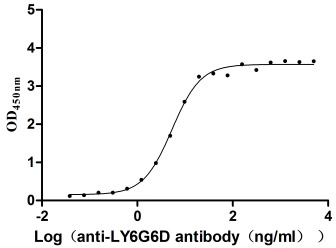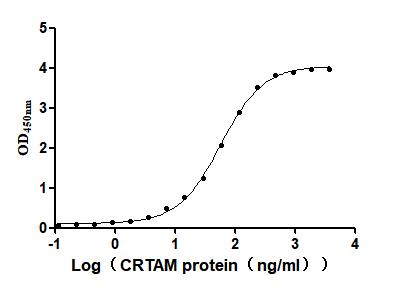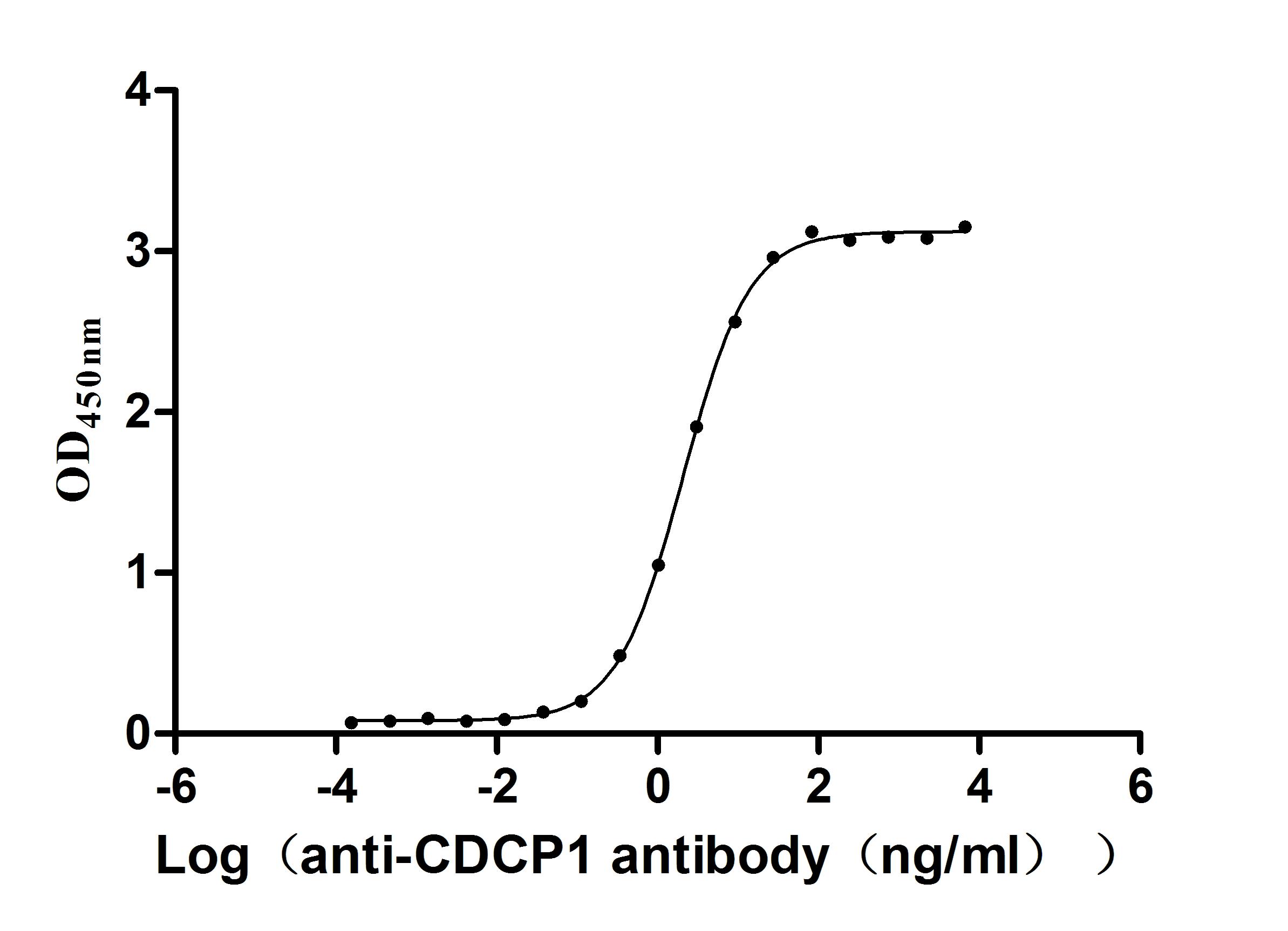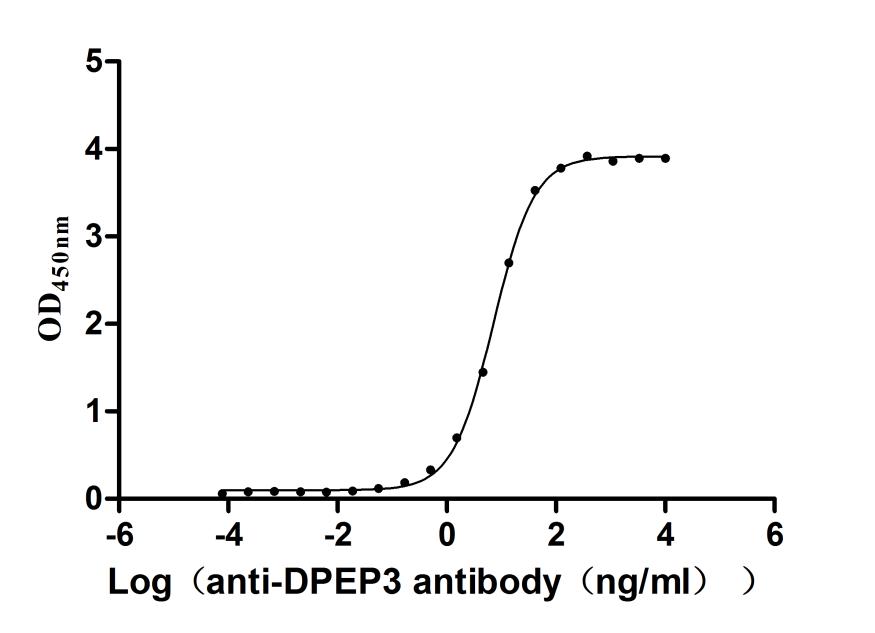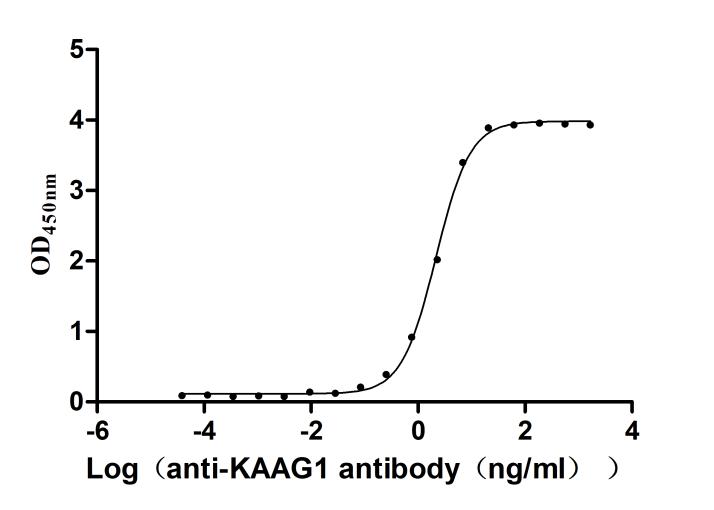Recombinant Mouse Disks large homolog 4 (Dlg4)
-
货号:CSB-YP730775MO
-
规格:
-
来源:Yeast
-
其他:
-
货号:CSB-EP730775MO
-
规格:
-
来源:E.coli
-
其他:
-
货号:CSB-EP730775MO-B
-
规格:
-
来源:E.coli
-
共轭:Avi-tag Biotinylated
E. coli biotin ligase (BirA) is highly specific in covalently attaching biotin to the 15 amino acid AviTag peptide. This recombinant protein was biotinylated in vivo by AviTag-BirA technology, which method is BriA catalyzes amide linkage between the biotin and the specific lysine of the AviTag.
-
其他:
-
货号:CSB-BP730775MO
-
规格:
-
来源:Baculovirus
-
其他:
-
货号:CSB-MP730775MO
-
规格:
-
来源:Mammalian cell
-
其他:
产品详情
-
纯度:>85% (SDS-PAGE)
-
基因名:
-
Uniprot No.:
-
别名:Dlg4; Dlgh4; Psd95; Disks large homolog 4; Postsynaptic density protein 95; PSD-95; Synapse-associated protein 90; SAP-90; SAP90
-
种属:Mus musculus (Mouse)
-
蛋白长度:full length protein
-
表达区域:1-724
-
氨基酸序列MDCLCIVTTK KYRYQDEDTP PLEHSPAHLP NQANSPPVIV NTDTLEAPGY ELQVNGTEGE MEYEEITLER GNSGLGFSIA GGTDNPHIGD DPSIFITKII PGGAAAQDGR LRVNDSILFV NEVDVREVTH SAAVEALKEA GSIVRLYVMR RKPPAEKIIE IKLIKGPKGL GFSIAGGVGN QHIPGDNSIY VTKIIEGGAA HKDGRLQIGD KILAVNSVGL EDVMHEDAVA ALKNTYDVVY LKVAKPSNAY LSDSYAPPDI TTSYSQHLDN EISHSSYLGT DYPTAMTPTS PRRYSPVAKD LLGEEDIPRE PRRIVIHRGS TGLGFNIVGG EDGEGIFISF ILAGGPADLS GELRKGDQIL SVNGVDLRNA SHEQAAIALK NAGQTVTIIA QYKPEEYSRF EAKIHDLREQ LMNSSLGSGT ASLRSNPKRG FYIRALFDYD KTKDCGFLSQ ALSFHFGDVL HVIDASDEEW WQARRVHSDS ETDDIGFIPS KRRVERREWS RLKAKDWGSS SGSQGREDSV LSYETVTQME VHYARPIIIL GPTKDRANDD LLSEFPDKFG SCVPHTTRPK REYEIDGRDY HFVSSREKME KDIQAHKFIE AGQYNSHLYG TSVQSVREVA EQGKHCILDV SANAVRRLQA AHLHPIAIFI RPRSLENVLE INKRITEEQA RKAFDRATKL EQEFTECFSA IVEGDSFEEI YHKVKRVIED LSGPYIWVPA RERL
-
蛋白标签:Tag type will be determined during the manufacturing process.
The tag type will be determined during production process. If you have specified tag type, please tell us and we will develop the specified tag preferentially. -
产品提供形式:Lyophilized powder
Note: We will preferentially ship the format that we have in stock, however, if you have any special requirement for the format, please remark your requirement when placing the order, we will prepare according to your demand. -
复溶:We recommend that this vial be briefly centrifuged prior to opening to bring the contents to the bottom. Please reconstitute protein in deionized sterile water to a concentration of 0.1-1.0 mg/mL.We recommend to add 5-50% of glycerol (final concentration) and aliquot for long-term storage at -20℃/-80℃. Our default final concentration of glycerol is 50%. Customers could use it as reference.
-
储存条件:Store at -20°C/-80°C upon receipt, aliquoting is necessary for mutiple use. Avoid repeated freeze-thaw cycles.
-
保质期:The shelf life is related to many factors, storage state, buffer ingredients, storage temperature and the stability of the protein itself.
Generally, the shelf life of liquid form is 6 months at -20°C/-80°C. The shelf life of lyophilized form is 12 months at -20°C/-80°C. -
货期:Delivery time may differ from different purchasing way or location, please kindly consult your local distributors for specific delivery time.Note: All of our proteins are default shipped with normal blue ice packs, if you request to ship with dry ice, please communicate with us in advance and extra fees will be charged.
-
注意事项:Repeated freezing and thawing is not recommended. Store working aliquots at 4°C for up to one week.
-
Datasheet :Please contact us to get it.
靶点详情
-
功能:Postsynaptic scaffolding protein that plays a critical role in synaptogenesis and synaptic plasticity by providing a platform for the postsynaptic clustering of crucial synaptic proteins. Interacts with the cytoplasmic tail of NMDA receptor subunits and shaker-type potassium channels. Required for synaptic plasticity associated with NMDA receptor signaling. Overexpression or depletion of DLG4 changes the ratio of excitatory to inhibitory synapses in hippocampal neurons. May reduce the amplitude of ASIC3 acid-evoked currents by retaining the channel intracellularly. May regulate the intracellular trafficking of ADR1B. Also regulates AMPA-type glutamate receptor (AMPAR) immobilization at postsynaptic density keeping the channels in an activated state in the presence of glutamate and preventing synaptic depression (Probable).
-
基因功能参考文献:
- Study found robust hypersocial behavior in the dyadic interaction test in both PSD95(+/-) males and females. Additionally, male PSD95(+/-) mice exhibited higher levels of aggression and territoriality, while female PSD95(+/-) mice showed increased vocalization upon exposure to an anesthetized female mouse. Both male and female PSD95(+/-) mice revealed mild hypoactivity in the open field but no obvious motor deficit. PMID: 28189758
- Results show the binding of PSD95 to GluN subunit 2A is modulated by CIN. PMID: 27212638
- these data identify PSD95 nanoclusters as a basic structural unit, or building block, of excitatory synapses and their number characterizes synapse size and structural diversity PMID: 27109929
- This study demonstrated that in Chronic social defeat stress leads to changes PSD-95 in hippocampus of young mice. PMID: 27609644
- The s present evidence that synGAP-alpha1 regulates the composition of the postsynaptic density by restricting binding to the PDZ domains of PSD-95. PMID: 27623146
- In Fmr1 KO neurons, Mdm2 is hyperphosphorylated, nuclear localized basally, and unaffected by MEF2 activation, which our data suggest due to an enhanced interaction with Eukaryotic Elongation Factor 1alpha (EF1alpha), whose protein levels are elevated in Fmr1 KO. Expression of a dephosphomimetic of Mdm2 rescues PSD-95 ubiquitination, degradation and synapse elimination in Fmr1 KO neurons. PMID: 28025327
- tested the effect of five targeted mouse mutations on the assembly of known PSD95 interactors, Kir2.3, Arc, IQsec2/BRAG1 and Adam22 PMID: 28452394
- PSD95 and SYP may originate from the different sites, but they are closely related to the formation and maturation of synapse. PMID: 27916092
- The results suggest that the neurological mechanisms of chronic stress on cognition might be associated with a decrease in hippocampal SYN and PSD95 expression, which is critical for structural synaptic plasticity. PMID: 27562628
- critical roles of PSD-95 in regulating synaptic kainate receptors. PMID: 26746114
- Phenylketonuric mice given a specific nutrient combination showed a significant reduction in PSD-95 expression in the hippocampus, specifically in the granular cell layer of the dentate gyrus, with a similar trend seen in the cornus ammonis 1 (CA1) and cornus ammonis 3 (CA3) pyramidal cell layer. PMID: 27102170
- Lambda-cyhalothrin (LCT) could increase the PSD95 protein level via the ERalpha-dependent Akt pathway, and LCT might disrupt the up-regulation effect of estradiol on PSD95 protein expression via this signaling pathway. PMID: 26969072
- Data show that in adult PSD-95 knockout mice, ocular dominance plasticity in visual cortex (V1) was preserved after a stroke lesion in somatosensory cortex (S1). PMID: 26930616
- adult mice lacking interleukin-1 receptor 1 (IL-1R1) exhibit increased expression of both the excitatory scaffolding protein postsynaptic density-95 (PSD-95) and inhibitory scaffolding proteingephyrin, respectively, in the hippocampus. PMID: 25263489
- Data demonstrate a role for SNAP-25 in controlling PSD-95 clustering and open the possibility that genetic reductions of the protein levels may contribute to the pathology through an effect on postsynaptic function and plasticity. PMID: 25678324
- Rph3A interacts with GluN2A and PSD-95 forming a complex that regulates NMDARs stabilization at postsynaptic membranes. PMID: 26679993
- Egr-1 is involved in NMDAR-mediated PSD-95 down-regulation and AMPAR endocytosis, a process important in the expression of long term depression PMID: 26475861
- Homer1a may be a key neuroprotective endogenous molecule that protects against NMDA-induced neuronal injury by disassembling NR2B-PSD95-nNOS complexes and reducing the membrane distribution of NR2B. PMID: 26247728
- Results identify PSD-95 in the infralimbic cortex as a critical mechanism supporting the durability of fear memories over time PMID: 25510511
- ephrin-B3 specifies the synaptic localization of PSD-95 and likely links the synaptic stability of PSD-95 to changes in neuronal activity PMID: 26479588
- PSD-95 transcripts undergo polypyrimidine tract binding protein (PTBP)-dependent alternative splicing of its pivotal exon 18 required to avoid nonsense-mediated decay PMID: 25540577
- LGI1 and ADAM22 form an essential synaptic organizing complex that coordinates the maturation of excitatory synapses by regulating the functional incorporation of PSD-95 PMID: 26178195
- postsynaptic density protein-95 (PSD-95) was absolutely required for experience-dependent maturation of silent synapses, and its absence before the onset of critical periods resulted in lifelong juvenile ocular dominance plasticity PMID: 26015564
- PSD-95 knockout did not attenuate ethanol tolerance. PMID: 24397780
- these findings show a coordinated regulation of PSD95/Dlg4 mRNA by FMRP and FXR2P that ultimately affects its fine-tuning during synaptic activity. PMID: 26109663
- In hippocampal neurons from Fmr1-knockout mice, there was a transient elevation of endogenous PSD-95 within dendrites. PMID: 25948262
- This study demonstrated that PSD-93 KO confers profound neuroprotection against ischemic brain injury, which probably links to the inhibitory effect on Fyn-mediated phosphorylation of NR2B caused by PSD-93 deletion. PMID: 24787897
- IL-1b stimulates the transcription of cystathionine beta-synthase, and the generated hydrogen sulfide predominantly sulfhydrates GAPDH at its cysteine 150, enhancing its binding to the E3 ligase Siah, thereby augmenting degradation of PSD95. PMID: 25435139
- PSD-95 was fluorescently labeled and found to be in nearly all dendritic spines in CA1 neurons. PMID: 25505322
- These results support the hypothesis that deletion of PSD-95 in mutant mice produces concomitant overactivation of both D1 and NMDA receptors that makes neurons more susceptible to NMDA excitotoxicity, causing neuronal damage and neurological impairments. PMID: 24702501
- Inflammatory pain might increase interleukin-6 levels and decrease PSD-95 levels in the cortex, but not hippocampus of mice, leading to hippocampus-independent cognitive impairment in mice. PMID: 24878682
- Data show upregulation of PSD-95 protein in wild type mice, whereas maze training-related protein increases were blunted in Fmr1 knockout mice; findings suggest reduced PSD-95-associated postsynaptic plasticity may contribute to learning and memory deficits observed in fragile X syndrome patients PMID: 24323121
- results demonstrate that nonpathogenic HTT can indeed influence synaptic protein localization and uncover a novel role of HTT in PSD-95 distribution. PMID: 24347167
- Dendritic spine volumes and PSD-95 accumulation are associated with increased spine lifetimes; data indicate that PSD size relates to spine stability in vivo. PMID: 24501349
- interactions of G protein-coupled receptors with postsynaptic density protein 95 PMID: 23691031
- Results indicate that SNX26 interacts with PSD-95 and regulates formation of dendritic spines. PMID: 24003235
- Data indicate that LRP1 cound be co-precipitated with PSD-95 and the NMDA receptor subunits GluN1, GluN2A, and GluN2B in synaptosomal membrane preparations. PMID: 23760271
- our current study identified a functional interplay between PSD-95 and synapse-associated protein 102 (SAP102) to regulate synaptic AMPA receptors PMID: 23946397
- Higher ratios of PSD-95/GluN2B and GAIP-interacting protein C-terminus (GIPC)/GluN2B were associated with poorer learning index scores across all ages. PMID: 23884936
- The association of the postsynaptic density protein PSD-95 with TrkB is critical for intact BDNF signaling, and elevated levels of Arc were found to impede PSD-95/TrkB association. PMID: 23424281
- These findings reveal that PSD-95 including its ligand binding of the PDZ1/2 domains controls the synaptic clustering of PSD-MAGUKs and AMPA receptors. PMID: 23268962
- Stimulation of the hippocampal 5-HT(1A)-R caused a dramatic increase in PSD95 expression and dendritic spine and synapse formation through sequential activation of the mitogen-activated protein kinase isozymes Erk1/2 and protein kinase C (PKC). PMID: 22832728
- Study demonstrates that Pcdh10 is required for MEF2-induced synapse elimination and functions to deliver ubiquitinated postsynaptic density protein 95 (PSD-95), a critical synaptic scaffolding molecule to the proteasome. PMID: 23260144
- This study demonistrated that simple associative learning required Dlg4. PMID: 23201973
- 30-week-old BDNF/ mice displayed increased TrkB levels in the hippocampus but not in the motor neocortex PMID: 22776425
- PSD-95 appears to be a neuropathological substrate to impaired synaptic transmission in the hippocampus during autoimmune demyelinating disease. PMID: 22956822
- The expression of PSD-95 during early neural development is controlled at the RNA level by two PTB proteins whose sequential downregulation is necessary for synapse maturation. PMID: 22246437
- These data reveal a major, novel role for PSD-95 in mediating EtOH behaviors, and add to growing evidence that PSD-95 is a key mediator of the effects of multiple abused drugs. PMID: 21309945
- Synpatopodin may play an important role in the changes of PSD-95 and NR1 protein levels and other synaptic alterations that are induced by corticosterone PMID: 21190219
- Inhibition of Cdk5 activity enhances PSD-95 ubiquitination without affecting PSD-95 protein levels in vivo in mice, suggesting a nonproteolytic function of ubiquitinated PSD-95 at synapses. PMID: 21849563
显示更多
收起更多
-
亚细胞定位:Cell membrane; Lipid-anchor; Cytoplasmic side. Cell junction, synapse, postsynaptic density. Cell junction, synapse. Cytoplasm. Cell projection, axon. Cell projection, dendritic spine. Cell projection, dendrite. Cell junction, synapse, presynapse.
-
蛋白家族:MAGUK family
-
组织特异性:Highly expressed in CA1 stratum oriens and stratum radiatum hippocampal neurons. Expressed in the outer plexiform layer of the retina of the eye (at protein level).
-
数据库链接:
KEGG: mmu:13385
STRING: 10090.ENSMUSP00000018700
UniGene: Mm.27256
Most popular with customers
-
Recombinant Mouse Microtubule-associated protein tau (Mapt) (Active)
Express system: Mammalian cell
Species: Mus musculus (Mouse)
-
Recombinant Macaca fascicularis lymphocyte antigen 6 family member G6D (LY6G6D) (Active)
Express system: Yeast
Species: Macaca fascicularis (Crab-eating macaque) (Cynomolgus monkey)
-
Recombinant Mouse Cytotoxic and regulatory T-cell molecule (Crtam), partial (Active)
Express system: Mammalian cell
Species: Mus musculus (Mouse)
-
Recombinant Macaca fascicularis CUB domain containing protein 1 (CDCP1), partial (Active)
Express system: Mammalian cell
Species: Macaca fascicularis (Crab-eating macaque) (Cynomolgus monkey)
-
Recombinant Human Dipeptidase 3(DPEP3), partial (Active)
Express system: Mammalian cell
Species: Homo sapiens (Human)
-
Recombinant Human Kidney-associated antigen 1(KAAG1) (Active)
Express system: E.coli
Species: Homo sapiens (Human)


